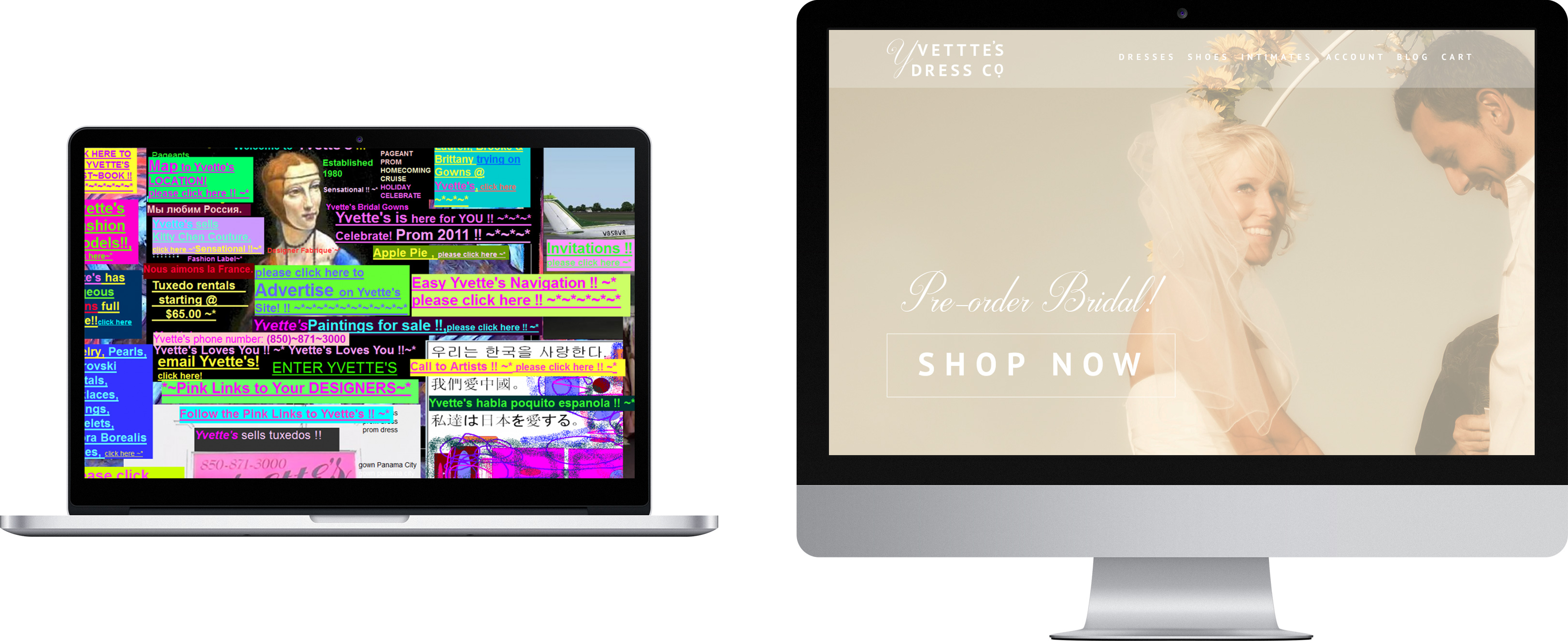How to Buy a Website
We understand how daunting it can feel to start shopping for a website - but the process should be exciting, and ultimately the best investment in your business. Our guide has the critical steps to make buying a website smooth and easy.
First, what are your goals?
Outlining your goals before finding a developer is a perfect first step toward buying a website. Do you need a site that can handle millions of users uploading data? Tiers of user permissions? Do you just need a place to post artwork and contact information? If you already have a website - what do you want to improve?
These questions are critical enquiries into what you need to propel your business, and you will be sharing this information with a developer once you find the right fit, so it's a great idea to start before your search.
Let's start with an example - a bakery that specializes in cookies:
LAUNCHING A COOKIE BUSINESS WEBSITE - NEEDS
- A few pages to display menu, pictures, and about
- page to order cookies online
- A blog
- Varied levels of admin accounts, one for the manager and one for content creators
LAUNCHING A COOKIE BUSINESS WEBSITE - GOALS
- Increase awareness of brand
- increase sales
- streamline online sales
- promote products and news
- accrue a following
A website is a not an expense, but an investment

You may have seen roadside signs announcing "Build your own website today, only $500!" But this neglects the principle of getting a website in the first place - a website is not an expense but an investment.
Consider the return on your investment: a $500 website might share some of your business's basic information, but look awful or lead to no sales - and you lost money. A more professional website costs more upfront, but the increase in conversions alone will immediately pay for the site and continue to be the best investment you've made in your business.
Check out the comparison above - Yvette's Dresses can have some online presence, or they can invest in a better user experience - built strategically to lead the user to purchase dresses, with e-commerce, account management and customer rewards.
Digital experts build websites with the goal of conversion. Designs are custom, compelling and provide a smooth flow for the user to make a purchase; spending less for a quick-fix is usually a waste of time, money, and energy.
Next - the search for your ideal consultant
First, let's start with a list of key terms:
- Web Developer*: a programmer; someone who builds software/writes and implements code.
- Web Designer*: someone who works on the "front-end" of a website, handling graphics, user experience features like navigation and page layout, colors, typography, and the style or "look and feel" of your site.
- Internet Marketer: specializes in content creation, graphics, photography, social media marketing, and SEO. They can also craft reports on traffic and plan strategies to grow conversions and awareness of your brand. Ideal if you already have a perfect website.
- Graphic Designer: ideal if you need your menu redesigned, new business cards, etc.
- Web Design Studio: fear not - you do not need to hire multiple consultants for a website. Most web design studios have developers, designers, and marketers, and hybrid combinations like designers with marketing backgrounds or designers with strong programming backgrounds.
 *The best technology consultants cannot afford to be experts in only one aspect of web development, which is why most web developers and designers are hybrids and have mastered a combination of web design, programming, UX engineering, and internet marketing.
*The best technology consultants cannot afford to be experts in only one aspect of web development, which is why most web developers and designers are hybrids and have mastered a combination of web design, programming, UX engineering, and internet marketing.
If you need a new website and to grow a following for your identity, a studio is a one-stop shop where you can have a team dedicated to your entire presence and image. For our cookie business, we would want a web design studio or a hybrid designer/developer.
If you prefer face-to-face communication or need help explaining what you are looking for, seek a local web designer or studio who can provide consulting. If you have an easier time expressing what you want for your website, you can seek out any national studio or designer to work on your website.
Clearly express your expectations
Once you have decided on a consultant, make sure you express your goals and your image of how you want the new website to look. Try to avoid feeling-based examples. We know how difficult that is, though - which is why we also recommend sharing links to website designs you like and want to emulate.
| X AVOID ABSTRACT IDEAS LIKE: | ► INSTEAD, FOCUS ON CONCRETE TERMS: |
|---|---|
| bright | "image-driven content/lots of pictures" |
| crisp | "editorial typography" |
| clean | "low-contrast, flat design" |
| open | "a white background" |
| moody | "dark background, monochrome, editorial or serif fonts" |
| make it pop | "clear calls to action" |
| modern | "responsive/mobile-friendly/flat design" |
Compare your choices with your business plan
Does one studio have a great portfolio but has a difficult time communicating ideas with you? Do you prefer working with one group over another? You will potentially have a lasting relationship with your web designer, so it is important to find someone in your budget that you also enjoy working with.
Embark on a journey of a refreshed identity
Awesome, you focused your plan and are ready to move forward with your developer! Enjoy your new identity, plan your marketing strategies, and make sure your content is invigorating and informative.
You may also want to read: Internet Marketing & Making the Most of your Website

